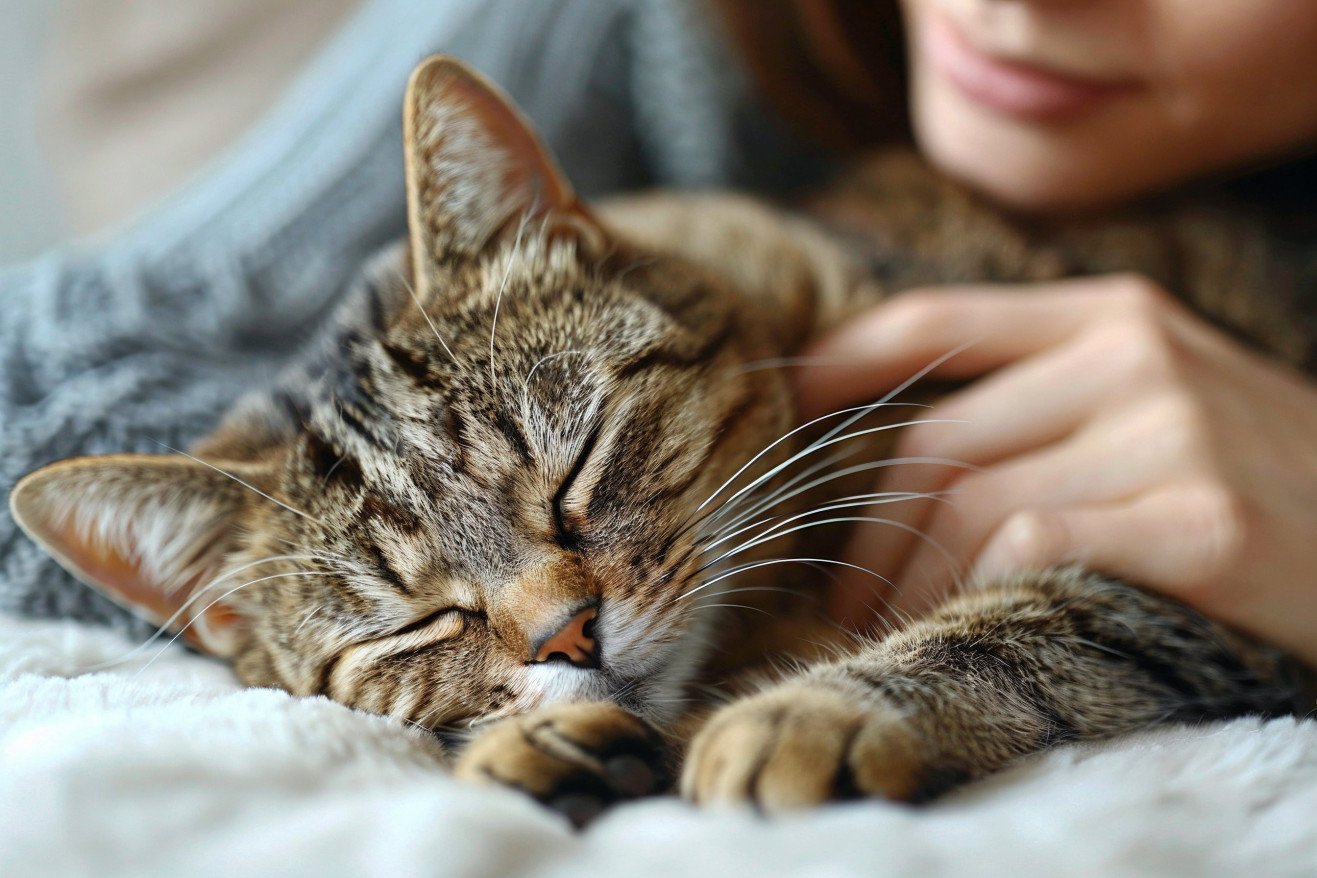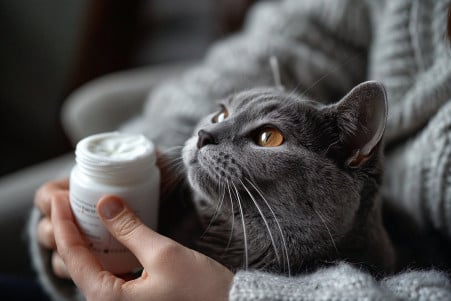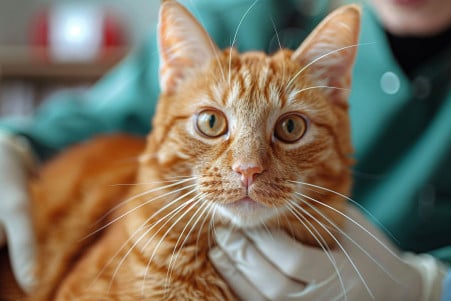Is It OK to Pick Scabs Off Cats? Here's What Vets Say
29 May 2024 • Updated 28 May 2024

Scabs on cats can be uncomfortable and unattractive, which may leave cat parents wondering if they should be left alone or removed. While picking at scabs can offer some relief, it's best to avoid it because it can lead to inflammation, infection, delayed healing, excessive bleeding, and may cause your cat to excessively lick or chew the area.
While it can be frustrating for cat parents to deal with scabs, this article will cover the opinions of veterinarians on the topic. By looking at the science and biology of how scabs form on cats, you'll learn the best ways to treat them to ensure your cat is comfortable and the wound heals as quickly as possible. We'll cover scientific studies, individual cases, and science-backed advice to come up with a well-rounded way to deal with this common issue in cats.
Is it okay to pick scabs off cats?
Knowing the Dangers: Why You Should Never Pick Scabs Off Cats
Scabs are a sign that the body is healing, and they help protect wounds while new skin grows underneath. Per Hepper, scabs are the body's way of protecting the wound, so picking them off will only prevent the skin from healing and make it take longer to heal. Picking or pulling off scabs can break the protective barrier that they create, which can lead to inflammation, infection, and a longer healing time.
Picking can also cause the wound to bleed more, cause more pain, and make the area more irritated. WebMD explains that you should never pick off scabs because it can lead to a cycle of itching, licking, hair loss, and worsening skin problems. If you pick off the scab, cats can lick or chew the area more, which can lead to infection and a cycle of irritation and injury.
Veterinary professionals are in agreement that picking scabs off cats is a bad idea because it can lead to a longer healing time and more serious issues. Per Catster, "The main thing to remember is that scabs are there for a reason. Picking or scrubbing them off will do more harm than good." Instead, it's important to let the scabs fall off on their own to ensure that the wound heals properly.
Cat Scabs: What's Causing Your Cat's Skin Issues?
There are many reasons why a cat may have scabs on its skin, including external irritants, allergies, skin infections, parasites, and overgrooming. Flea bites and flea allergies are two of the most common reasons for scabs on a cat's skin, according to Catster, and they can cause intense itching, hair loss, and skin irritation.
Food allergies, environmental allergies, and contact allergies to things like flea collars or bedding can also cause skin issues and scabs. PetMD notes that scabs and skin lesions can also be a sign of underlying health issues like feline acne, eosinophilic granuloma complex, or autoimmune disorders.
In order to effectively treat scabs and prevent future skin problems, it's important to identify and treat the cause of the scabs. This requires a proper diagnosis from a veterinarian to determine the cause of the scabs and ensure your cat gets the care it needs.
When to See a Vet: Symptoms to Look Out For
If scabs don't improve or get worse after at-home care, it's important to see a vet for medical treatment. Kingsdale Animal Hospital lists symptoms that indicate a vet visit is needed, including excessive scratching, biting, or licking of the scabs, hair loss, and if the scabs turn into open sores or become infected.
Puncture wounds, bite wounds, or symptoms of an infection, such as redness, swelling, and pus, should be treated by a vet right away to avoid further issues, according to PetMD. Cats with lots of scabs, scabs that don't improve, or scabs that are accompanied by other symptoms may have an underlying condition that needs to be treated.
As FirstVet points out, it's important to see a vet to make sure you're taking the right steps and to ensure the cat's health. A vet can help get to the bottom of the issue and make sure the cat is comfortable.
Home Remedies for Cat Scabs
While it’s important to have your cat seen by a vet, there are some home remedies that can be used to help alleviate and manage cat scabs. HolistaPet notes that oatmeal baths, coconut oil, and aloe vera can all help with itching and healing if used safely and responsibly. Vets may also suggest antibacterial soaps or topical creams to treat certain types of scabs, like those associated with feline acne.
Changing your cat’s diet to a hypoallergenic or nutrient-dense food can also help with scabs caused by allergies or nutritional deficiencies. KittyNook Cat Company also notes that yogurt, lemon juice, and Epsom salt baths can help with itching and healing for cat scabs.
That said, it’s important to talk to your vet before trying any home remedies, as some may not be effective and others could be harmful based on the cause of your cat’s scabs. It’s important to work with a vet to get a proper diagnosis and treatment plan to ensure that you’re able to effectively and safely manage your cat’s skin condition.
Prevention: How to Keep Your Cat's Skin Healthy and Scab-Free
Regular vet visits and preventive care can help catch and treat potential problems before they result in scabs, according to Animal Friends Dermatology. Proper grooming and hygiene, including brushing and bathing, can help prevent skin issues and excessive shedding.
A well-balanced, high-quality diet that addresses dietary allergies and sensitivities can help keep your cat's skin and coat healthy, says Paws Elite. Preventive measures for fleas and parasites, such as topical treatments and environmental control, can help prevent infestations that can lead to skin issues and scabs, according to Tucson Vets.
Reducing stress and creating a safe, comfortable environment can also help prevent skin issues and excessive grooming in cats. By being proactive and making sure to cover all of these bases, cat owners can help prevent their pets from developing scabs.
Conclusion: How to Best Deal With Cat Scabs
Although it can be tempting to pick at scabs on your cat, it's usually best to avoid doing so to prevent further complications and prolong the healing process. Knowing the potential dangers and causes of scabs is important for proper care and addressing any underlying issues.
Veterinary care is important, especially if the scabs don't go away, get worse, or show signs of infection or excessive irritation. There are also safe and gentle home remedies that can be used in conjunction with preventive measures such as good grooming and parasite control to help manage and reduce the frequency of scabs.
By taking a comprehensive approach that focuses on your cat's skin health and overall well-being, you can help ensure that your cat heals as quickly and comfortably as possible.


